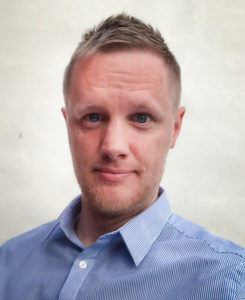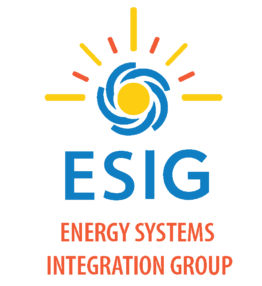
- This event has passed.
G-PST/ESIG Webinar Series: Planning and Designing Denmark’s Future Energy Islands – a Large Scale 100% Inverter-based Offshore Power System
October 13, 2021 @ 3:00 pm - 4:00 pm EDT

Planning and Designing Denmark’s Future Energy Islands – a Large Scale 100% Inverter-based Offshore Power System
Wednesday, October 13 – 3:00 – 4:00 p.m. (eastern US)
Featured Speaker: Christian Frank Flytkjær, Senior Manager, Grid Analysis, Energinet
 Webinar Abstract: To harvest wind energy efficiently, Denmark is constructing two energy islands. The energy islands will serve as offshore hubs, collecting and transmitting wind energy to Denmark and other European countries by several interconnectors installed on the hub. At a later stage, PtX-plants will be installed reducing transmission capacity needs. The ambition is to construct one 3 GW island in the North Sea expandable to 10 GW and one in the Baltic Sea as well. Both can be considered 100% inverter-based power systems designed from a blank sheet of paper. This presentation will cover the power system design considerations and technologies enabling the hubs.
Webinar Abstract: To harvest wind energy efficiently, Denmark is constructing two energy islands. The energy islands will serve as offshore hubs, collecting and transmitting wind energy to Denmark and other European countries by several interconnectors installed on the hub. At a later stage, PtX-plants will be installed reducing transmission capacity needs. The ambition is to construct one 3 GW island in the North Sea expandable to 10 GW and one in the Baltic Sea as well. Both can be considered 100% inverter-based power systems designed from a blank sheet of paper. This presentation will cover the power system design considerations and technologies enabling the hubs.
Moderator: Charlie Smith, Executive Director, ESIG
Registration Cost: FREE
Q&A Session: We will be using the slido platform for Q&A. Please submit your questions and follow-along during the event at this link.
About the Speaker: Christian is currently Senior Manager of Energinet’s Grid Analysis department, which is responsible for Energinet’s stability and power quality assessments. Before his current role, Christian was Chief Engineer, also with Energinet. Christen obtained his bachelor, master and PhD degrees at Aalborg University in Denmark.
About G-PST Consortium
The chief executive officers of National Grid Electricity System Operator UK, California Independent System Operator (CAISO), Australia Energy Market Operator (AEMO), Ireland’s System Operator (EirGrid), and Denmark’s System Operator (Energinet) are champions in developing the consortium mission and activities. Importantly, these system operators are leading a Research Agenda Group to identify common, cutting-edge research questions that can inform large- scale national research and development investments. Relevant results and lessons from this process will be broadly shared for learning across all countries. The Consortium is also partnering with around 10 emerging economy and developing country system operators from Africa, Asia, Latin America and Eastern Europe who will also guide the G-PST vision and collaborate with the Consortium to advance power system transformation with a focus on technical collaboration, peer learning and exchange, and workforce development to support local PST priorities.
A core team, including the Energy Systems Integration Group (ESIG), Imperial College London, Council of Scientific and Industrial Research (CSIR), Fraunhofer Cluster of Excellence for Integrated Energy Systems, National Renewable Energy Laboratory, Latin American Energy Organization (OLADE), IEEE, Electric Power Research Institute (EPRI), Commonwealth Scientific and Industrial Research Organization (CSIRO), the Danish Technical University (DTU), and ASEAN Center for Energy, is actively developing the consortium and will be engaged in implementation of technical work as well as coordinating specific pillars.
International agencies and multilateral and regional development banks, including World Bank, United States Agency for International Development (USAID), German Agency for International Cooperation (GIZ), International Energy Agency (IEA), Asian Development Bank (ADB), European Bank for Reconstruction and Development (EBRD) and others are serving as key implementing partners to ensure the consortium complements and reinforces existing programs.
For more information on the G-PST visit https://globalpst.org/.

